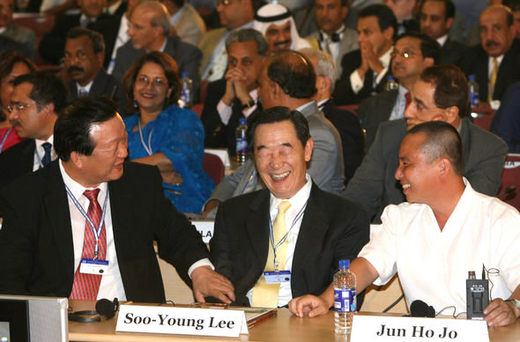Posted on : Aug.30,2006 11:57 KST
Modified on : Aug.30,2006 14:01 KST
 |
|
Leaders of civic groups and unions gather at the Asian Regional Meeting of the International Labor Organization (ILO) in Busan on August 29.
|
There is a meaningful event going on right now in Busan, at which participants from nations in the Asia-Pacific region are looking for ways to create better labor conditions. The Asian Regional Meeting of the International Labor Organization (ILO) takes place every four years and will continue this year until September 1. Approximately 600 representatives from labor, business, and government have come from approximately 40 countries. The event presents our society with an opportunity to think about international labor issues, but the sad realities faced by workers in Korea make you feel like international issues are concerns for other countries. It is actually turning into a time when others are learning about the lack of rights faced by Korean laborers.
A fact-finding group representing the international labor community, here in Korea on the occasion of the ILO meeting, attempted to visit the offices of the new civil servants’ union but was prevented from doing so by the Gyeonggi provincial government. The group criticized Korea for "meeting the demands of the World Trade Organization while failing to keep its promises to the International Labor Organization" and said it would report its findings to the ILO and the Organisation for Economic Cooperation and Development (OECD) and continue to monitor the labor situation here. Korea has failed to adopt repeated recommendations by the ILO for improving labor policy. Typical examples would be its failure to fully guarantee civil servants the "three labor rights" - freedom of association, right to bargain collectively, and the right to strike. This is one of the reasons Korea continues to be labeled a country that suppresses labor.
To make matters worse, a migrant worker who represents fellow foreign laborers in the Korean Confederation of Trade Unions (KCTU, Minju Nochong) was kept away from the proceedings because he is currently an illegal alien. He was on his way to a session discussing ways to protect migrant laborers and he was an official delegate from KCTU, and the government was as unflexible and intolerant as could be in preventing him from attending. An ILO event is a rare opportunity to make your claims known to the global labor community, so the right to attend such an activity should be guaranteed within certain limits.
And so, as it turns out, the world is being shown Korea’s shameful labor policies and harsh conditions during this ILO meeting in Busan. All of this is, in turn, the result of a "policy for show" that obsesses over appearances without making substantial policy changes and improvements in labor conditions.
Nevertheless, Korea still has an opportunity to have the meeting come to an admirable end. The government should immediately begin listening to criticism from Korean and international labor organizations and demonstrate a willingness work together to resolve the issues. The world will take a new look at Korea when changes have been made, and Korean labor and the government will be able to restore mutual confidence. One hopes to see the meeting in Busan be a starting point for resolving the many labor issues Korea faces today.

